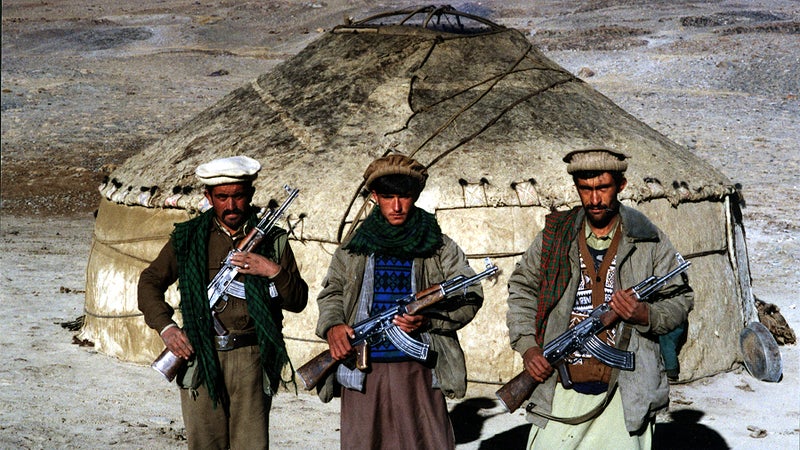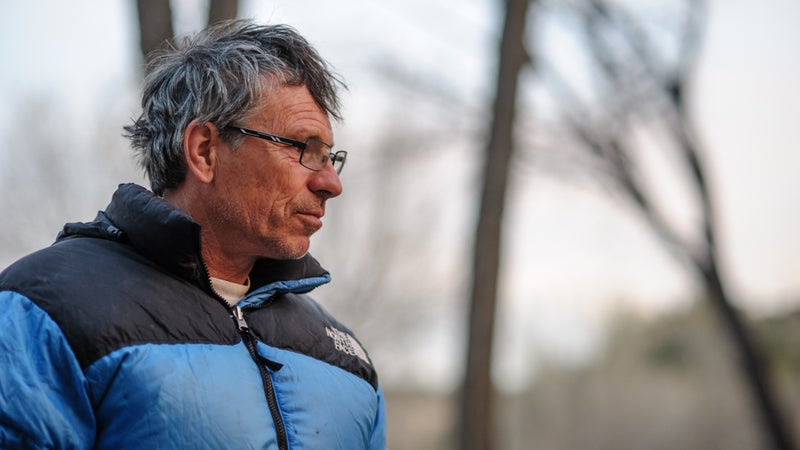In August 2000, a year before the September 11 attacks, American climbers Tommy Caldwell, Beth Rodden, Jason Singer, and John Dickey were kidnapped at gunpoint by Islamic militants while climbing Kyrgyzstan’s famous Yellow Wall. Greg Child told their story in the ���ϳԹ��� article “Fear of Falling” and in the book . In a new edition published this month by Mountaineers Books, Child looks back on what, in retrospect, was the beginning of a dangerous new era in adventure.
It took me a few years to figure out that the story I had really told when I wrote Over the Edge was a story about the loss of innocence. The incident 14 years ago in which four young Americans stumbled into a terrifying world of violent extremism, and later survived a tumultuous escape, was a pivotal episode in their lives from which they emerged intact—yet changed. Thirteen months later, the United States suffered its own collective loss of innocence with the attacks on New York and the Pentagon on September 11, 2001.
Prior to 9/11 we lived in a comparatively blissful state. I recall optimism, tolerance, and a sense of prosperity in the United States and Europe. American travelers, and most everyone else, hopped on international flights (with our shoes on our feet) and crossed most borders with ease. There was a sense that we were welcome (nearly) everywhere. When the hijacked jets destroyed the World Trade Center, we were stunned not only by the loss of life but also by our failure to have seen it coming. The vast majority of us didn’t realize the breadth and depth of the gulf that had grown between two world cultures.
The violent incursion into Kyrgyzstan by the Islamic Movement of Uzbekistan (IMU), and the way it swept the young climbers into its suicidal procession, somewhat presaged the post-9/11 era of seemingly nonstop wars. While the United States began scaling back its involvement in 2011, in September 2014 a new campaign began, in Syria and Iraq, against the Islamic State (also called ISIL and ISIS).
These wars, old and new, are being fought against people not unlike those members of the IMU whom I wrote about in Over the Edge. We understand such people no better than in 2001, nor do they understand us. The gap between our two worlds is the story of our times.
[quote]It took longer than I expected for terrorists to again target climbers, but when they did, the brutality was shocking.[/quote]
Reexamining the issues I wrote about back then has been daunting because the backstory to the settings in Over the Edge concerns a labyrinth of struggles embroiling the Islamic world.
The IMU itself is a perfect example. As the U.S.-led coalition booted the Taliban from power after the 9/11 attacks, it was reported that the IMU—battle-hardened troops training and sheltering in Afghanistan, whose leadership was beholden to bin Laden—were bombed out of existence by U.S. air raids. That’s what I reported in Over the Edge. It turns out, however, that while plenty of IMU, Taliban, and other bin Laden loyalists died or were captured, many others escaped as well, fleeing by truck, foot, and plane across the Afghan border into Pakistan.
Just last June, ten allegedly Uzbek militants in Karachi, Pakistan, and killed 29 Pakistani soldiers and civilians. All the militants were killed. On a website, the IMU claimed responsibility for the attack and posted photos of their “martyrs” wearing black turbans and holding AK-47s. The IMU’s resurgence shows that these armies of darkness are like the Hydra, sprouting two new heads whenever one is chopped off.

I always believed that what happened to the four climbers in Over the Edge would be repeated in some way, in some other mountain outpost where climbers, in their base camps below the mountains, are sitting ducks. It took longer than I expected for terrorists to again target climbers, but when they did, the brutality was shocking.
It happened during the night of June 22, 2013, at the base camp of a multinational team attempting to climb Nanga Parbat, the ninth-highest mountain in the world, located in northern Pakistan. This particular base camp, under the west side of the mountain, is at the end of the Diamir Valley, reached by 15 miles of trail accessible only by foot or packhorse. The base camp, at an altitude of 13,000 feet, is a spectacular place, the destination of many Western mountaineers and trekkers; approximately 50 foreign climbers were up on Nanga Parbat on various routes at the time of this incident.
On that night, 16 young men armed with automatic rifles and knives—allegedly wearing uniforms of the local police, the Gilgit Scouts—suddenly appeared at the international camp. Yelling that they were Taliban and Al Qaeda and that everyone should surrender, they swarmed through the campsite, ordered the occupants out of their tents, and tied their hands. Other militants collected passports and money from the tents. Whenever they found satellite phones, radios, or laptops, they smashed them with rocks.
Only one foreigner would survive: a Chinese mountaineer and former policeman named Zhang Jingchuan, who freed his wrists and ran into the night amid a hail of gunfire. The several other survivors were Pakistani staff members of the expedition who persuaded the militants they were of the Ismaili sect, with whom the militants—Sunnis—had no blood quarrel. Among the Pakistanis was a climber named Sher Khan, who provided most of the information later reported by the media.
According to his account, after everyone in camp had been rounded up, the militants separated the foreigners from the Pakistanis, forced everyone to kneel, and shot the foreigners from behind. Ten climbers were murdered, including a Chinese national with U.S. citizenship, Honglu Chen, and others from China, Ukraine, Slovakia, Lithuania, and Nepal. The 11th murder was of Pakistani cook Ali Hussain; although a Muslim, he apparently was killed for being Shiite.
[quote]Climbers always believe the worst will happen to someone else. That’s how they mentally survive.[/quote]
Sher Khan told the media that the killers left shouting, “God is great,” “Long live Islam,” and “Long live Osama bin Laden,” and that one said, “This is revenge for Sheikh bin Laden.” When Zhang Jingchuan sensed that the attackers had left, he crept back to camp, found a working satellite phone, and raised the alarm. Approximately nine hours later, a Pakistani military helicopter and soldiers arrived. By then, the militants had disappeared.
After the attack, two related extremist groups—Jundallah and Tehriki-Taliban (TTP, or Pakistani Taliban)—jointly claimed responsibility. Numerous suspects were arrested in a police dragnet, but most have been cleared and released. To date, it’s unclear if anyone connected with the murders has been caught.
Who are these people who would slaughter unarmed, defenseless foreign visitors at a base camp in the mountains? Where did they come from? In the published by Sher Khan on National Geographic’s website, he said the militants variously spoke three languages: Urdu, the Pakistani national tongue; Pashto, spoken in Afghanistan; and Shina, the local dialect. This might hint of a Taliban leadership with local recruits.
The mountains and valleys between Pakistan and Afghanistan are wild country, and the Taliban have been there ever since the United States pushed them out of Afghanistan in 2001. More extremists flocked to the area after the Pakistan army started cracking down on them in the Swat area, in 2009; millions of refugees have fled the fighting during these campaigns.

The factions involved in the conflict make for a confusing hall of mirrors in which extremists can be allies of the Pakistan government one day (when they are fighting the Indian army in Kashmir) and enemies on another day (when they jeopardize Pakistani interests). At this point in history, the so-called War on Terror has shifted from Afghan soil to Pakistani soil, and instead of U.S. and NATO boots on the ground, U.S. special ops and drones prowl the valleys searching for terrorists on kill lists, while Pakistani troops launch major offensives.
How does this affect those who are drawn to the mountains to climb, to explore, and to soak in their beauty?
Climbers always believe the worst will happen to someone else. That’s how they mentally survive.
“That avalanche?” they wonder. “No, it’s not for me.”
“That storm on the horizon? I’ll get down the mountain before it hits,” they reason.
Climbers were back at Nanga Parbat in the season of 2014, albeit with promises of added security from Pakistan. The overall numbers of climbers and trekkers were, however, lower. Local people in the Diamir area, who spoke against the attacks soon after they occurred, were feeling the loss of the usually dependable, well-paid work that tourism provides. Eventually foreigners will start returning en masse, but who can say where or when there will be another strike like the one at Nanga Parbat? Recent history suggests that it is just a matter of time.
Greg Child is the author of , from which this article is excerpted (Mountaineers Books, $16.95.) A longtime contributor to ���ϳԹ���, he lives in Castle Valley, Utah.


